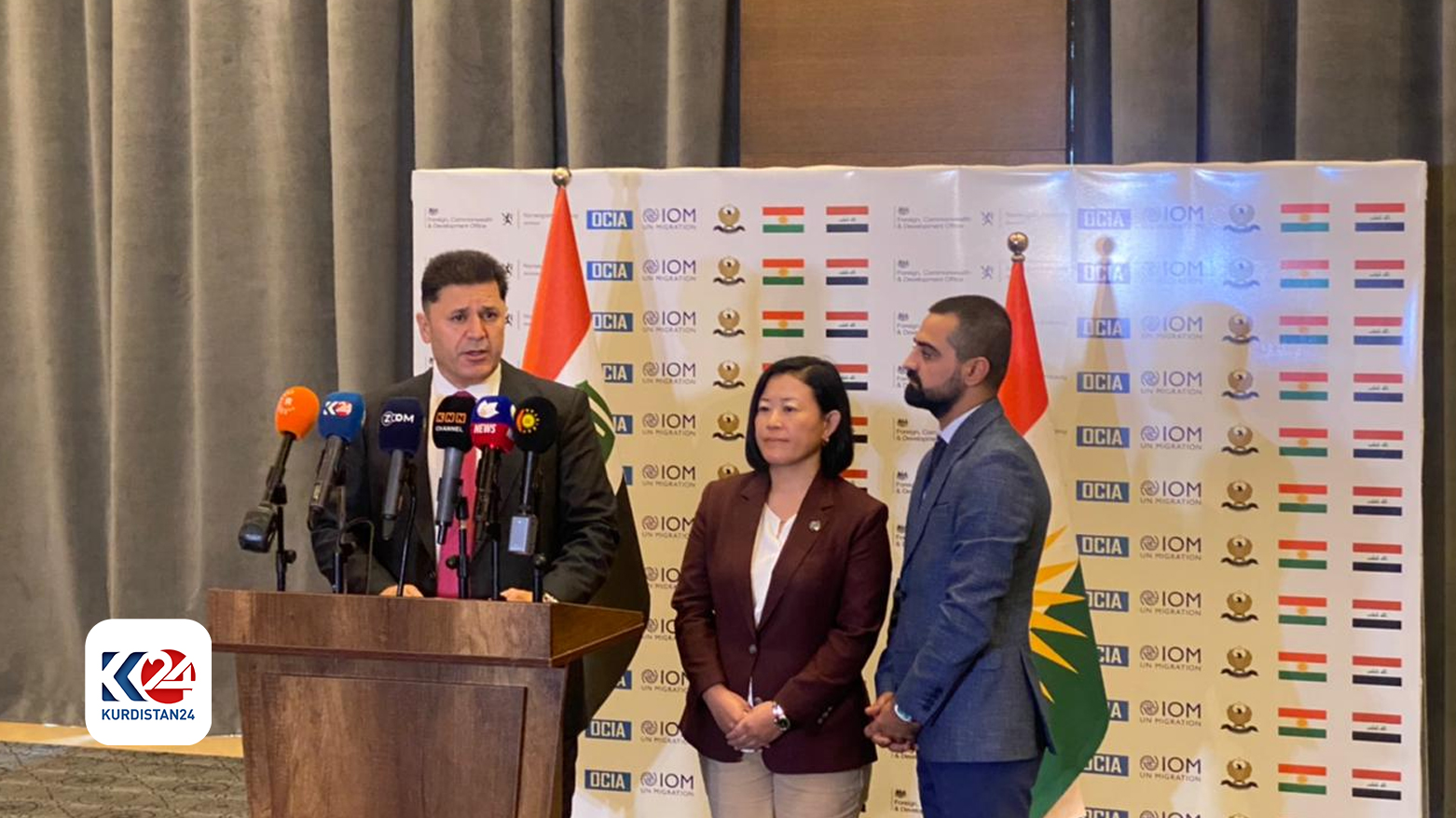KRG Reaffirms Commitment to IDP Rights at Erbil Conference: A Path Toward Dignified Return, Stability
“The active engagement of these diverse stakeholders—including legal authorities, humanitarian agencies, and representatives from key ministries—ensures a holistic and strategic approach to addressing the complex challenges faced by IDPs,” Dr. Zebari stated.

ERBIL (Kurdistan24) — At a pivotal conference held in Erbil, Dr. Dindar Zebari, the Kurdistan Regional Government (KRG) Coordinator for International Advocacy, delivered a powerful address underscoring the KRG’s unwavering commitment to promoting the rights of Internally Displaced Persons (IDPs) in accordance with international standards.
The conference, titled "Promoting the Rights of Internally Displaced Persons (IDPs) in Accordance with International Standards," was organized in collaboration with the International Organization for Migration (IOM) and brought together a diverse group of stakeholders, including senior government officials, diplomats, UN representatives, and community leaders.
Dr. Zebari expressed deep gratitude to the IOM for their instrumental role in organizing this significant event. He emphasized that the conference was meticulously designed to foster in-depth dialogue and collaborative initiatives aimed at addressing the pressing issues faced by IDPs daily.
“The active engagement of these diverse stakeholders—including legal authorities, humanitarian agencies, and representatives from key ministries—ensures a holistic and strategic approach to addressing the complex challenges faced by IDPs,” Dr. Zebari stated.
KRG’s Commitment and Legislative Efforts
Dr. Zebari highlighted the KRG's consistent efforts to provide refuge and protection to hundreds of thousands of IDPs during their most vulnerable times.
He stressed the importance of ensuring that any potential closure of IDP camps within the Kurdistan Region is approached with caution and sensitivity, ensuring that returns are voluntary and conducted under supportive and well-prepared conditions.
One of the significant challenges discussed was the absence of specific legislation within both the Kurdistan Regional Government and the Federal Government of Iraq that directly addresses the rights and protections of IDPs.
In response, the KRG has been proactive in drafting administrative guidelines in collaboration with the UNHCR, aimed at organizing asylum affairs and safeguarding the rights of asylum seekers and refugees within the region.
Additionally, Dr. Zebari announced the development of a draft national migration strategy in collaboration with the IOM, marking a significant step forward in addressing the needs of IDPs and aligning the KRG's policies with international standards as outlined in the KRG’s Human Rights Action Plan.
Implementing International Recommendations
The KRG has implemented 48 specific recommendations across various ministries to address the needs of IDPs, covering essential areas such as healthcare, education, legal aid, and infrastructure.
The implementation rate of these recommendations stands at an impressive 70.1%, reflecting substantial progress while highlighting the need for continued efforts.
Special attention has been given to women and girls in IDP camps, with over 15,000 benefiting from essential services, including healthcare, psychological support, and vocational training programs.
The KRG has also expanded healthcare facilities in remote areas to better serve these vulnerable populations.
Challenges and Future Commitments
Despite these efforts, Dr. Zebari acknowledged the ongoing challenges, particularly in securing multilateral donations and addressing suspensions and delays in national funding, which have led to shortages in the daily operation of essential services for IDPs.
However, he reaffirmed the KRG’s commitment to enhancing the quality of life for IDPs and ensuring their well-being.
The conference also addressed the ongoing partnership challenges with Federal Authorities in managing IDP affairs. Dr. Zebari emphasized the need for continued dialogue and collaboration to ensure that the needs of all displaced persons are met effectively and equitably.
A Commitment to Human Rights and Stability
Dr. Zebari concluded his address by reaffirming the KRG’s dedication to human rights and social harmony.
He highlighted the KRG’s long-standing commitment to ensuring that every individual in the region can live with dignity and security, regardless of nationality, religion, or belief.
In a poignant reminder, Dr. Zebari referenced the tragic genocide faced by the Yezidi community in Sinjar, perpetrated by ISIS, and reaffirmed the KRG’s commitment, under the leadership of Prime Minister Masrour Barzani, to normalizing the situation in Sinjar.
He emphasized the importance of implementing the Sinjar Agreement to restore peace, stability, and local governance, allowing the displaced Yezidis to return and rebuild their lives.
As the conference concluded, Dr. Zebari expressed hope that the discussions would lead to impactful solutions and enduring partnerships, ultimately forging a future where every displaced person can attain safety, stability, and an unwavering sense of belonging.
"May our dedication remain steadfast as we strive to forge a future where every displaced person can attain safety, stability, and an unwavering sense of belonging," Dr. Zebari said in his closing remarks.